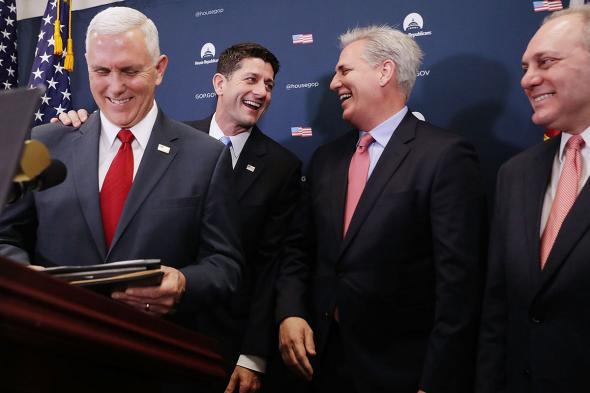The Republican Party in 2017 isn’t an ordinary political party. It is an ideological outlier, the most extreme party coalition since the Civil War. Trump voters may expect a more conservative spin on the status quo, but what they’ll get is a radical shift to the right, with fundamental changes to vital programs such as Medicare and Medicaid. Trump voters who earnestly hoped for relief are in for a shock. What they’ll receive instead is an assault on their fraying social safety net.
Of everything that contributed to Donald Trump’s victory last November, one major factor was his distance from conservative ideology. Throughout the campaign, Trump was more likely to defend programs such as Social Security and Medicare than voice conservative shibboleths on taxes and “small government.” He told his supporters he would repeal Obamacare, but he would be sure to take care of them, promising government programs for them, the deserving.
The irony is that he did this as the nominee for a GOP that has turned sharply against government assistance and whose mainstream either contests the necessity of the welfare state or wants to slash it altogether. In their book It’s Even Worse Than It Looks: How the American Constitutional System Collided With the New Politics of Extremism, scholars Norman Ornstein and Thomas Mann illustrate the radicalism of the contemporary Republican Party by contrasting the 111th Congress (elected in 2008) with the 112th, seated after the Tea Party wave election of 2010. “The 2010 election dramatically increased the conservative tilt of the House Republicans. Nearly 80 percent of the freshmen [sic] Republicans in the 112th Congress would have been in the right wing of the party in the 111th Congress,” write Ornstein and Mann. Overall, congressional Republicans have moved sharply to the right, occupying an ideological space of strict libertarian conservatism. Or, as former Nebraska Sen. Chuck Hagel, a Republican, said in a 2011 interview following the unprecedented standoff over the debt ceiling, “I think the Republican Party is captive to political movements that are very ideological, that are very narrow.”
Look to the states and you can see what this conservatism looks like in action. The same Tea Party that handed the House of Representatives to Republicans in 2010 also elevated Sam Brownback to the Kansas governor’s mansion and gave him GOP majorities to work with. In short order, they slashed income taxes for the wealthy, repealed taxes for tens of thousands of businesses, privatized Medicaid delivery, and slashed hundreds of millions of dollars from the state education budget. The results speak for themselves. Tax cuts starved the state for revenue, earning it massive deficits with little additional job growth. Those deficits sparked a fiscal crisis, forcing painful cuts to higher education and other essential services.
Similar policies brought similar results to Louisiana under Gov. Bobby Jindal. During his two terms, Jindal slashed taxes on the wealthy, cut social services, and borrowed to make up the difference. To deal with years of massive budget shortfalls—$1.6 billion in 2015, Jindal’s final year in office—Louisiana has cut funding from education, health care, and criminal defense services, including $800 million from Medicaid services for the elderly and $142 million in funding for hospitals. Students face tuition hikes, and the poor are set to lose more services and assistance.
Despite the ruinous results in our laboratories of democracy, Republicans want to bring these policies to the nation at large. GOP leaders are planning strategies for how to repeal the Affordable Care Act, slash upper-income and corporate tax rates, and end the tax on wealthy estates. They seek a full rollback of Obama-era regulations on climate and employment and want to turn Medicaid into a series of “block grants” that would cut the program beyond recognition in states with hostile legislatures. They want to cut food stamps and other forms of income assistance, while adding tough new requirements for eligibility. They want to free banks to resume predatory lending and—assuming they find the support—want to turn Medicare into a series of vouchers, while also reducing the amount of money that goes into the program.
Taken together, congressional Republicans want to roll back government to what it was before Lyndon Johnson, not just Barack Obama, and from Kansas, Louisiana, and other GOP-controlled states such as Michigan, Wisconsin, and North Carolina, we have a good idea of what the results will be. Trump’s ascension promises a radical, and potentially disastrous, reordering of American governance. Millions will lose assistance—siphoned for the sake of tax cuts—and millions more will face the brunt of a policy agenda that gets most of its funds from cuts to programs for poor and working families.
Observers from across the political spectrum are, for good reason, focused on the most extraordinary elements of Trump and his impending administration—the corruption, the demagoguery, the dishonesty, the racism. But we shouldn’t forget that the more “ordinary” part of the next four years, the Republican domestic policy agenda, is just as radical, just as extraordinary.
